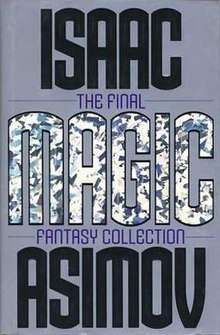Magic (short story collection)
Magic (1996) is a collection of short stories and essays by Isaac Asimov, all within (or concerning, in the latter case) the fantasy genre, collected and released after his death. The first seven stories are part of his Azazel series, while the remainder are three more traditional medieval fantasies and one mystery story from Asimov's Black Widowers series.

First edition (publ. Harper Prism)
Contents
"Introduction"
Part One: The Final Fantasy Stories
- (1989) "To Your Health"
- (1992) "The Critic on the Hearth"
- (1991) "It's a Job"
- (1991) "Baby, It's Cold Outside"
- (1990) "The Time Traveller"
- (1990) "Wine Is a Mocker"
- (1989) "The Mad Scientist"
- (1987) "The Fable of the Three Princes"
- (1994) "March Against the Foe"
- (1989) "Northwestward"
- (1991) "Prince Delightful and the Flameless Dragon"
Part Two: On Fantasy
- (1985) "Magic"
- (1986) "Sword and Sorcery"
- (1991) "Concerning Tolkien"
- (1985) "In Days of Old"
- (1985) "Giants in the Earth"
- (1982) "When Fantasy Became Fantasy"
- (1978) "The Reluctant Critic"
- (1986) "The Unicorn"
- (1987) "Unknown"
- (1978) "Extraordinary Voyages"
- (1985) "Fairy Tales"
- (1986) "Dear Judy-Lynn"
- (1984) "Fantasy"
Part Three: Beyond Fantasy
- (1990) "Reading and Writing"
- (1996) "The Right Answer"
- (1989) "Ignorance in America"
- (1989) "Knock Plastic!"
- (1989) "Lost in Non-Translation"
- (1989) "Look Long Upon a Monkey"
gollark: I generally want less, but pandemic control is somewhat hard to do outside of governments with how things currently work.
gollark: Arguably, people infecting you with viruses infringes on your rights.
gollark: Fine. I think it's reasonable to have governments remove some rights in some situations, then.
gollark: I think that if governments had actually been competent with initial containment, it wouldn't have been necessary to do lockdowns; given that they were useless, they were probably the least bad solution.
gollark: I was mostly complaining about their specific reasoning there (it is not very sensible, inasmuch as basically no possible bad event is *guaranteed* but ignoring the possibility of them is quite bad for you), but I don't agree with the rest of what they said either, so thing.
This article is issued from Wikipedia. The text is licensed under Creative Commons - Attribution - Sharealike. Additional terms may apply for the media files.